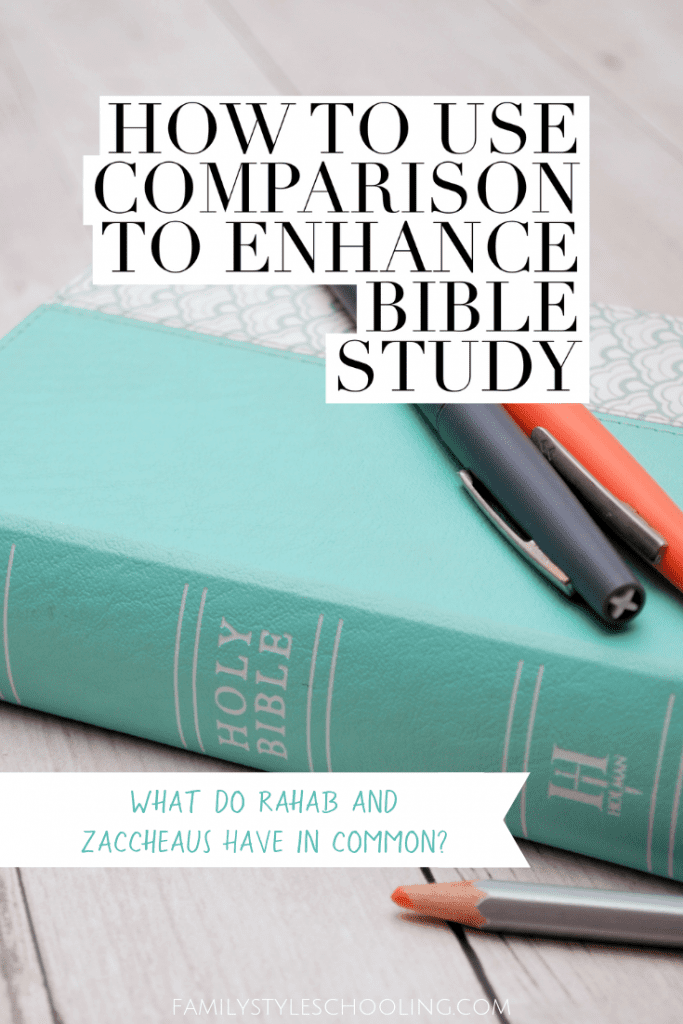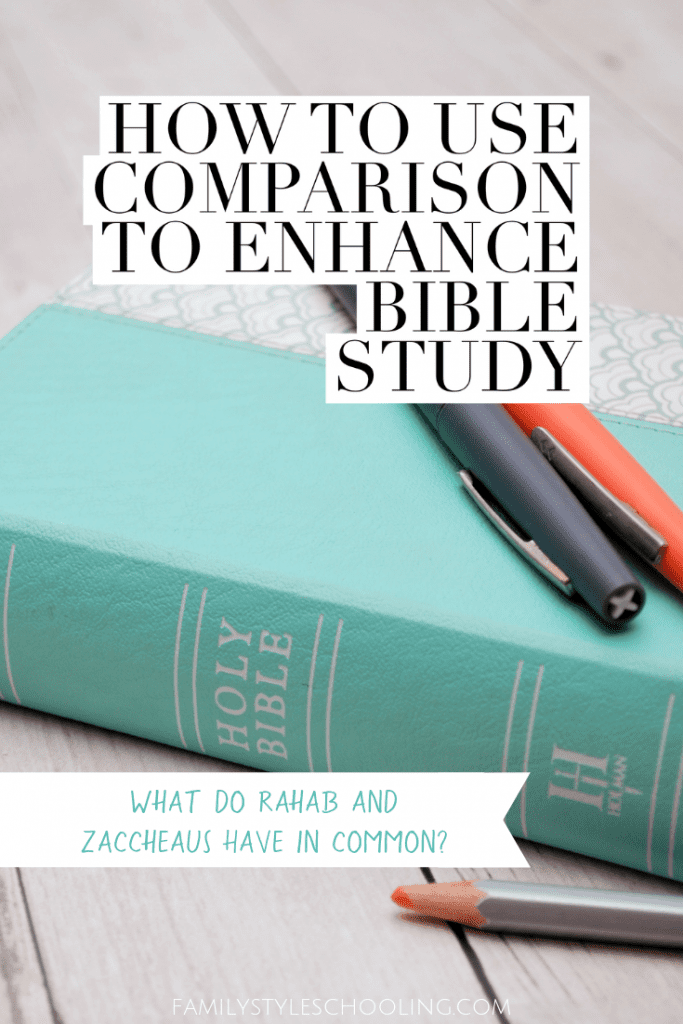How to Use Comparison to Enhance Bible Study
Of Aristotle's Five Common Topics, Comparison has always been the easiest for me. Perhaps it is because I grew up comparing things, whether good or bad, all of my life. This summer I led a seminar in using the topic of Comparison to generate ideas for an entire paper.
The topic of Comparison generates a wealth of ideas. Sometimes it is hard to get a conversation going about the Bible because as we get older we forget to wonder about the Bible. We've heard all of the stories before and so when we get to familiar subjects, we glance at them to see if they're still the same thing we know them to be, and then we move on. But what if you could slow down and wonder? Is there anything new to find in those old familiar stories?

Comparing Rahab and Zacchaeus
Our first character for comparison is Rahab, from Joshua 2. She is living in the ancient city of Jericho and works as a prostitute. When two spies arrive from Israel, she takes them in, hides them, and helps them escape. Her life is forever changed by this encounter.
Zacchaeus, a New Testament character who we meet in Luke 19, is a tax collector living in Jericho 2.0 about a mile south of the old ruins. I know him from the song we used to sing in Sunday school about him being a "wee little man", how he "climbed up in a sycamore tree" to see Jesus as he passed by, and how Jesus said, "Zacchaeus, you come down. For I'm going to your house today." His life is forever changed by this encounter.

How are they similar and different?
At face value, these two characters seem to have little more in common than a city name and a life change. When you work to find their similarities however, it really makes you consider how well you really know the characters, and it brings about a new sense of wonder.
In comparison there are three helpful categories to investigate as you look for similarities:
- What do they both have?
- What are they both?
- What do they both do?
As you identify similarities you can also note how they are different in those areas. You can look for differences in two categories as well:
- kind - is it a totally different type of thing
- degree - is one better/worse than the other
So let's see what we can discover about these familiar Bible characters.
What do they both have?
I love the brainstorming process. This is a time when all ideas are considered and none are thrown out. One thing at a time. Once you have all of your ideas, you can start to weed out the weak from the strong. Right now, don't judge, just consider:
- High Vantage Points
Rahab's home was situated in the wall where she could see everyone who was coming and going. This gave her a place to watch for newcomers to the town, and it seems that she gleaned a lot of great information from her high perch. It makes me wonder how often did she sit and watch? What else did she know about the people coming and going from her city?
Zacchaeus, on the other hand, was just a short guy in the right place. He was curious about Jesus, but he couldn't see over the crowd. Thankfully, he was resourceful and spry because he found a nearby tree to scale. How old do you think he was? What was he wearing? Did he do this often?
- Wealth
Rahab's wealth is shown in a more subtle fashion through the fact that she has a house and stalks of flax laid out on the roof. This means that she had the basics provided for and seemed to be living a pretty comfortable life. Compared to the Israelites who had been wandering in the desert, she was doing pretty well. It makes me wonder, did the king pay for her place or if she was self sufficient?

Zacchaeus's wealth is evident to all. It is expressed in his short bio in Luke 19:2 - He was the chief tax collector and he was wealthy. It makes me wonder why was he looking for anything else? Didn't he have everything he needed?
- Homes in Jericho
We've already briefly noted this, but it is fascinating to me that Jericho, which is leveled in Rahab's story - actually the event that even gives Rahab a place in the Bible - is mentioned again in the New Testament. Why did someone rebuild this city? Who would name it Jericho even if the land was reused?
After a little bit of research, I found that God told Joshua to tell the people that whoever tried to rebuild the city would be cursed (Joshua 6:26). This came true when Hiel of Bethel rebuilt Jericho in King Ahab's time (1 Kings 16:34). When we encounter Jericho in the New Testament, it is a buzzing Roman city where King Herod had built a winter home and eventually died (Encyclopedia Britannica).
So maybe this Realestate wasn't as much of an advantage for either Rahab or Zacchaeus as it seemed.
What are they both?
Our next category looks a little deeper into what kinds of people they are, but we're still just identifying the obvious. The deep epiphanies come when you least expect it.
- Workers of Odd Jobs
Let's face it: Rahab's job was not a career with a 401k retirement plan. She was a contract worker with a job that didn't generate respect from the Israelite religion. Yet, the spies trusted her. I wonder why.

Zacchaeus worked for the enemy. In the New Testament, the Israelites were now living under the thumb of the Romans, so a Tax Collector, while it was a lucrative and stable job, was not popular with the Israelites. Yet, Jesus sought Zacchaeus out and went to his house to eat with him. I wonder why.
- Robbers of Their Community
Even though Rahab's clients were willing participants, the act of prostitution robs the actors from the blessings of sex within the protection of a marriage relationship. It is no wonder Rahab was looking for help from the God of the Israelites.
Zacchaeus took money from people who did not wish to give it up. They were forced to give their precious resources to a regime they did not support. I wonder what sparked Zacchaeus' interest which led him to that tree on that day.
- Looked Down Upon
Both held occupations that did not generate esteem among their peers. One could make an argument that the city of Jericho was so corrupt that they esteemed Rahab as a prostitute, but the fact that the word "prostitute" is always attached to her name doesn't seem like a blessing.
When Jesus says he's going to Zacchaeus' house, the people all grumble around about how great of a sinner Zacchaeus is. Nobody likes him very much. I wonder what he thought about Jesus coming over to his house.
What do they both do?
Our final category for exploration is what do they both do.
- Pursue Truth
When Rahab talks to the spies, it is clear that she's been watching the God of the Israelites for some time. She's collected stories, watched for stagers, and seized the opportunity to seek out the truth. It's taken a long time, but then again her resources for accessing the truth were very limited. I wonder how long she'd been contemplating this idea.
Zacchaeus is actually fairly impulsive in his pursuit. It is more of a curiosity than a determined investigation like Rahab's. As a collector, it seems he's stumbled upon a richer pot than he imagined. I wonder if he realized the wealth he'd found.
- Take Risks
By hiding the spies, Rahab risks everything: her career, her life, and her family's lives. She was "all in" on the bet that God would win the battle against Jericho and she was willing to risk it all. I wonder how many times she's worked out the odds on this bet.
When Zacchaeus climbed that tree, he was really just improvising. He wanted a good look at Jesus, but from a safe place at a distance. Surely he didn't bet on Jesus walking up to him in that tree, calling him by name, and going home with him. I wonder if he realized the risk he was taking.
- Repent
In the end, Rahab leaves her life of prostitution to live with the people who serve the living God. She changes her ways, and ends up being known not for her sin but for being in the line of Christ (Matthew 1:5). She's commended for her faith (Hebrews 11:31) and righteousness (James 2:25). I'd say that she's changed. I wonder what her family thought of the change.
Although he's only mentioned in Luke, Zachhaeus has clearly repented since Jesus himself clearly vouches for him. Not only does Zacchaeus trust in Jesus, he also vows to give back more than he took from the people. He will no longer become wealthy at the expense of others. He's found the true source of wealth that will never perish. I wonder what his family thought about the change.
Lasting Impacts of Extravagant Faith
In my seminar with high school kids, they picked three similarities to attend to in their paper: both Rahab and Zacchaeus pursued truth, repented sins, and took risks. In the end they decided that Rahab had the greater faith and impact because of her place in the lineage of Christ.
What did we glean from this comparison? Extravagant faith impacts not just the person who is trusting God. Both Rahab and Zacchaeus impact the future of their immediate family, but additionally, their stories of faith are still being read today and impacting lives beyond their imaginations.
We don't make choices in isolation. Rahab and Zacchaeus are great examples of extravagant faith that we can follow.
Curiosity in Bible Study
We cannot let our familiarity or unfamiliarity with a Bible story shut down our wonder. Slow down. Consider the fact that these aren't just made up stores, but they are real people with real circumstances encountering a real God. It's powerful.
Each of these ideas sparked a new idea for wonder which could take your understanding of either one of these people to a richer and deeper level.

What do you wonder about?
Betsy Strauss is an unexpected homeschooler, mother of three, who is in a relationship with a sweet man for life. She loves reading books, drinking coffee, and learning anything with her kids.


A very good read. Felt like I was there at the play itself!